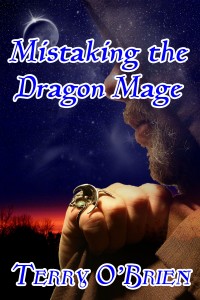 I don’t remember exactly how long ago I joined SFWA. I do know that it was shortly after my stories were published in the early issues of Marion Zimmer Bradley’s Fantasy Magazine, so that puts it somewhere around 1990, so this would be approximately my 25th year as a member. Therefore, as SFWA is celebrating its 50th anniversary this year, I have been a member of the organization for approximately half of SFWA’s existence.
I don’t remember exactly how long ago I joined SFWA. I do know that it was shortly after my stories were published in the early issues of Marion Zimmer Bradley’s Fantasy Magazine, so that puts it somewhere around 1990, so this would be approximately my 25th year as a member. Therefore, as SFWA is celebrating its 50th anniversary this year, I have been a member of the organization for approximately half of SFWA’s existence.
An Associate member, that is.
My two professional short story sales were enough to qualify for Associate status: Associate members gain access to the private online forums hosted by SFWA, copies of all publications produced by the organization, entry into any SFWA-hosted suites and events at conventions and the ability to recommend and nominate stories for the Nebula Awards. However, it takes three short story sales 1 or a novel sale to qualify for Active membership. Active members can also run for office within SFWA, vote in officer elections and vote for the Nebula Awards. 2
That’s all. There is a significant difference between them, but a difference only that affects the level of participation a member gives to the organization, not what the member receives from the organization. Once you are a member of SFWA, you become a part of the SFWA community, no matter your status, and receive all the benefits SFWA offers.
And that’s one of the things I most appreciate about SFWA. The Associate membership level gives people who are pursuing their professional writing career a step into the organization, and through that access to the many advantages of being a member of SFWA, and any time I talk to other beginning writers I always stress that if they are serious about writing science fiction or fantasy that they should join the organization.
Another thing I appreciate about SFWA is that the organization is an ardent advocate for writers in general, no matter their membership level or status, or even the genre. Many of the resources SFWA provides for its members, it also shares with writers of all levels and genres. The SFWA website is also stuffed with valuable information for writers, readers and educators and has been for years and years. 3 The Bulletin, SFWA’s own magazine on writing, SF and fantasy and a host of related items of interest, is available to any subscriber. Writers Beware is another public service, a continuing series of reports regarding consumer fraud and criminal practice involving dodgy agents, worthless publishers and anyone else seeking to make a dishonest dollar from unsuspecting authors new and old alike. There is also the official SFWA presence at major conventions, which varies from holding meetings for the members to staffing a table in the dealers area with books and publications by the members.
 The above are all things I appreciate about SFWA that I have direct experience with. There are a lot more things I appreciate about SFWA without any having direct personal experience regarding any of them, fortunately. Things that were created and grew and evolved because of the needs of the members of any level. These things involve writers with problems that arise from their professional status. Things like the SFWA Emergency Medical Fund, which exists to help writers in medical emergencies, as many writers do not have adequate health insurance. Things like the Grievance Committee, which exists to add the weight of the organization behind an writer in situations when the writer has been harmed by the actions of a convention or a publisher, for instance, or the Contracts Committee which advises and educates members regarding contracts.
The above are all things I appreciate about SFWA that I have direct experience with. There are a lot more things I appreciate about SFWA without any having direct personal experience regarding any of them, fortunately. Things that were created and grew and evolved because of the needs of the members of any level. These things involve writers with problems that arise from their professional status. Things like the SFWA Emergency Medical Fund, which exists to help writers in medical emergencies, as many writers do not have adequate health insurance. Things like the Grievance Committee, which exists to add the weight of the organization behind an writer in situations when the writer has been harmed by the actions of a convention or a publisher, for instance, or the Contracts Committee which advises and educates members regarding contracts.
But the biggest thing I appreciate about SFWA is that they let me join and let me stay. 4 Yes, I am still an Associate member, but that’s largely due to a number of contrary and intervening factors all in one way or another collected under the category of “life” and not any fault of SFWA or anyone involved with them.
However, I still work and dream about changing that.
1 “Short stories” in this situation essentially means any work under 40,000 words in length. Through personal experience, even stories that are upwards of 20,000 words are not exactly what I would call “short”.
2 There are other membership categories, too, but those primarily are for people in affiliated professions, such as editors, publishers, institutions and the like: the people who are associated with the genre but are not writers. In effect, they share the same privileges as an Associate membership.
3 Many, many years ago, I was a volunteer assistant webmaster on the SFWA website, back when HTML coding standards were more like suggestions and CSS was still only under consideration. Part of my responsibility was maintaining the Author Resources pages. It was pretty good back then, in the early days of the Internet, and its much better now.
4 Well, I do continue to pay the annual dues, too. That’s a pretty good reason for them to let me stay, I guess.
Terry O’Brien is a writer, programmer, gamer, photographer and videographer on both the amateur and professional level. As a fan, he once smuggled Oreo cookies into Britain for WorldCon and may have been the inspiration of a Roger Zelazny character. His first published work, ‘Mistaking the Dragon Mage’, published in Marion Zimmer Bradley’s Fantasy Magazine, is available for free through SmashWords. His most recent work, ‘Undercover Unicorn’, is self-published and is available through Amazon and SmashWords. For more information, refer to his website.
